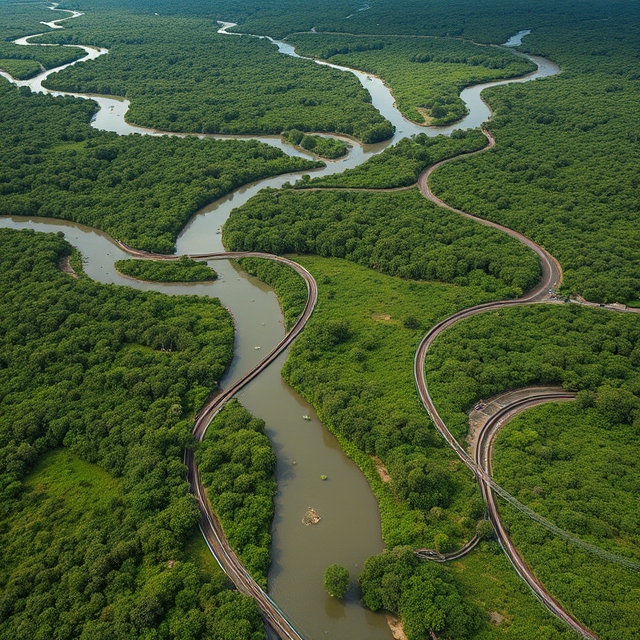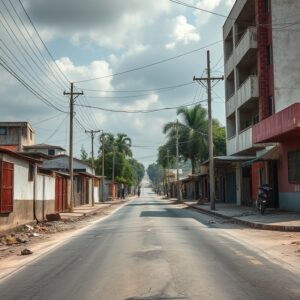Operation Crocodile Smile: Nigeria’s Oil Theft Crackdown

A serene view of the Niger Delta mangroves with pipelines and waterways in focus, symbolizing security efforts - AI Image
Operation Crocodile Smile: Nigeria’s War Against Oil Theft
The call came early in the morning. Colonel Musa Yusuf had just settled into his office at the 2nd Brigade Command in Port Harcourt when the message arrived. A task force was being mobilized under the directive of the Chief of Army Staff, Lieutenant General Tukur Yusuf Buratai. The name of the operation was striking: Operation Crocodile Smile. It was meant to send a clear message—swift, silent, and lethal action against oil thieves and pipeline vandals operating in the Niger Delta region.
By the time Musa entered the briefing room, the atmosphere was charged with purpose. Officers from the Nigerian Army, Navy, and Air Force were present, alongside representatives from the Department of State Services (DSS) and the Nigerian Security and Civil Defence Corps (NSCDC). Maps of the Niger Delta region sprawled across the table, dotted with red circles marking hotspots of illegal refining camps and pipeline sabotage. The stakes were high—Nigeria was losing billions of dollars annually to oil theft, a crisis that threatened both the economy and national security.
“This isn’t just about oil,” Buratai said, addressing the room via video link from Abuja. His tone was measured but firm. “The activities of these criminal elements are fueling insecurity, funding armed groups, and undermining the peace efforts in the Niger Delta. This operation will send a clear signal. We will not tolerate this.”
The plan was methodical. The task force would conduct land, air, and sea operations, dismantling illegal refineries, securing pipelines, and apprehending key figures behind the theft networks. Intelligence reports indicated that some local communities were complicit, either out of coercion or economic desperation. This complicated the mission; the task force had to be firm but avoid alienating innocent civilians.
The first phase of the operation began with reconnaissance. Troops were deployed to strategic locations across Rivers, Bayelsa, and Delta states. Musa oversaw the deployment of his unit to the Okrika area, a known hotspot for illegal refining. The team moved cautiously, guided by informants who had been embedded in the community for months. The smell of crude oil often hung in the air, a telltale sign of makeshift refineries hidden deep within the mangroves.
One of the informants, a local fisherman named Tamuno, had been instrumental in providing intelligence. He approached Musa during a quiet moment at the staging area. “Colonel, the boys running this operation are well-organized,” Tamuno said, his voice low but urgent. “They have scouts watching the waterways. You’ll need to approach from multiple directions.”
Musa nodded. “We appreciate your help. Stay safe and stay out of sight. Once we move in, things could get messy.”
The operation commenced at dawn. Using speedboats, a joint team of army and naval personnel navigated the creeks, avoiding detection as they closed in on the target. The makeshift refinery was larger than expected—dozens of barrels filled with stolen crude oil, surrounded by rudimentary distillation equipment. Several men were present, some armed with crude weapons, others scrambling to escape.
“Move in!” Musa barked into his radio. Soldiers disembarked swiftly, securing the area as others destroyed the equipment. A brief skirmish ensued, with two suspects apprehended while others fled into the dense vegetation. No casualties were reported, but the tension was palpable.
Throughout the Niger Delta, similar operations were underway. In the Gbaramatu Kingdom, another team uncovered a network of underground storage tanks filled with stolen crude. Naval patrols intercepted barges attempting to transport the oil to waiting ships offshore. Each success added to the momentum of the operation, but it was clear that the fight was far from over.
Back at the command center, reports poured in. The scale of the illegal operations was staggering. Intelligence officers worked around the clock to analyze seized documents and interrogate suspects. One name kept surfacing: Emeka “The Chief” Eze, a notorious kingpin believed to control a significant portion of the oil theft network.
Emeka’s operation was sophisticated, involving multiple layers of middlemen and armed groups. Capturing him would require careful planning. Musa and his team devised a strategy based on intercepted communications and the testimony of captured operatives. The target was a riverside warehouse in Yenagoa, Bayelsa State, where Emeka was believed to conduct business.
The raid on the warehouse was swift and precise. Soldiers breached the entrance, catching Emeka and his associates off guard. The kingpin attempted to flee but was subdued after a brief struggle. Inside the warehouse, security forces discovered ledgers, fake documents, and large sums of cash, evidence that would prove invaluable for prosecuting the case.
The arrest of Emeka was a significant victory, but the operation was not without challenges. In some areas, local communities protested the military’s presence, accusing them of heavy-handed tactics. Musa understood their frustration; many residents depended on the illegal oil trade for survival. He directed his troops to engage with the community leaders, explaining the purpose of the operation and offering assurances that innocent civilians would not be targeted.
The military also faced logistical hurdles. The terrain of the Niger Delta was treacherous, with narrow creeks, dense mangroves, and unpredictable weather. Equipment often broke down, and communication between units was occasionally disrupted. Despite these difficulties, the task force remained focused, driven by the knowledge that their efforts were crucial to restoring stability.
By the end of the operation, hundreds of illegal refineries had been destroyed, dozens of suspects apprehended, and significant quantities of stolen crude oil recovered. The financial impact on the oil theft networks was severe, and the message was clear: the era of impunity was over.
In the aftermath, the government announced plans to support alternative livelihoods for communities affected by the crackdown. Initiatives included skills training, agricultural programs, and increased investment in local infrastructure. Musa hoped these efforts would address the root causes of the problem and prevent a resurgence of illegal activities.
Operation Crocodile Smile was far from a complete solution to the complex challenges of the Niger Delta, but it marked a decisive step in the fight against oil theft. For Musa and his colleagues, the satisfaction came not from recognition or accolades but from knowing they had played a part in safeguarding Nigeria’s resources for future generations.






